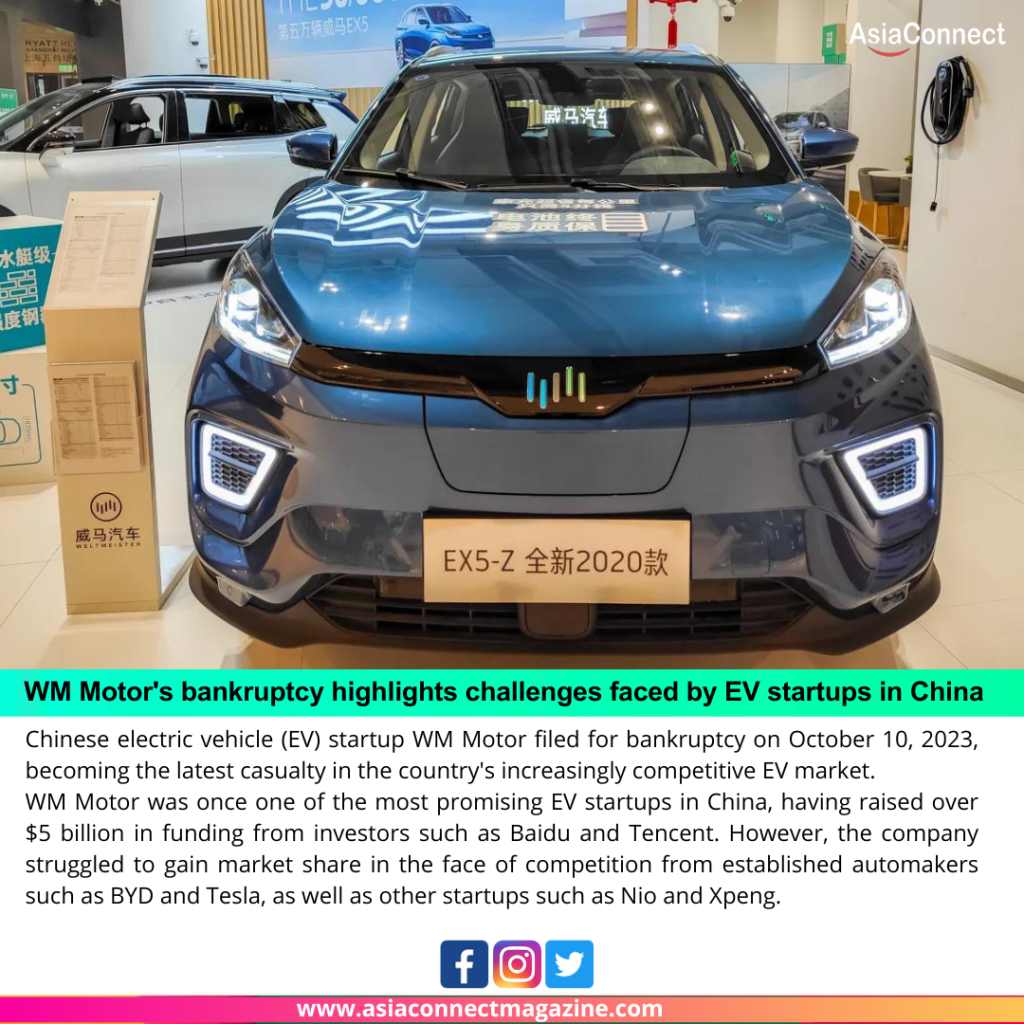
WM Motor’s bankruptcy highlights challenges faced by EV startups in China
Chinese electric vehicle (EV) startup WM Motor filed for bankruptcy on October 10, 2023, becoming the latest casualty in the country’s increasingly competitive EV market.
WM Motor was once one of the most promising EV startups in China, having raised over $5 billion in funding from investors such as Baidu and Tencent. However, the company struggled to gain market share in the face of competition from established automakers such as BYD and Tesla, as well as other startups such as Nio and Xpeng.
WM Motor’s bankruptcy highlights the challenges faced by EV startups in China. The Chinese EV market is highly competitive, with over 100 automakers producing EVs. The market is also dominated by established automakers, which have a significant advantage in terms of manufacturing scale and brand recognition.
In addition, the Chinese EV market is facing a number of challenges, including rising raw material costs, supply chain disruptions, and a slowdown in consumer spending. These challenges are making it difficult for EV startups to compete and to achieve profitability.
Here are some of the key challenges faced by EV startups in China:
- Competition from established automakers: Established automakers such as BYD, Geely, and SAIC Motor have a significant advantage over EV startups in terms of manufacturing scale, brand recognition, and dealer networks.
- High startup costs: Developing and producing EVs is a capital-intensive business. EV startups need to invest heavily in research and development, manufacturing facilities, and marketing.
- Rising raw material costs: The cost of lithium and other key battery materials has risen sharply in recent years, making it more expensive to produce EVs.
- Supply chain disruptions: The COVID-19 pandemic and other factors have caused disruptions to the global supply chain, making it difficult for EV startups to obtain the components they need.
- Slowdown in consumer spending: The Chinese economy is slowing down, and consumer spending is also slowing down. This is making it more difficult for EV startups to sell their vehicles.
Despite the challenges, there are still opportunities for EV startups in China. The Chinese government is committed to promoting the adoption of EVs, and it has introduced a number of supportive policies, such as subsidies and tax breaks.
In addition, the Chinese EV market is still growing rapidly. In 2022, sales of EVs in China reached 6.8 million units, up 93% from the previous year.
EV startups can succeed in the Chinese market by focusing on niche markets, such as high-performance EVs or luxury EVs. They can also compete by developing innovative products and technologies.
Here are some tips for EV startups to succeed in the Chinese market:
- Focus on niche markets: EV startups can compete by focusing on niche markets, such as high-performance EVs or luxury EVs. This will help them to avoid direct competition with established automakers in the mainstream EV market.
- Develop innovative products and technologies: EV startups can also compete by developing innovative products and technologies. For example, they can develop EVs with longer range, faster charging, or more advanced autonomous driving features.
- Partner with established automakers: EV startups can also partner with established automakers to gain access to their manufacturing and sales networks. This can help them to scale up their production and reach more customers.
The Chinese EV market is challenging, but it also presents opportunities for EV startups. By focusing on niche markets, developing innovative products and technologies, and partnering with established automakers, EV startups can succeed in the Chinese market.




